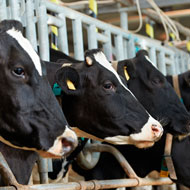Farmers shocked by First Milk decision

Milk payments will be delayed by two weeks and farmers will be required to pay more in capital investments.
Dairy company First Milk has announced it will delay milk payments by two weeks and recover extra capital from farmers due to cash flow problems. The news comes at a time when farmers are already under huge financial pressure due to severe milk price cuts.
National Farmers Union (NFU) has called the announcement "wholly unacceptable" and is in urgent talks with the company.
For the dairy industry, 2014 was a year of unprecedented volatility. Returns from globally traded products fell by more than half, causing milk prices to plummet. The most recent companies to announce cuts to their 2015 prices were Arla and Dairy Crest.
First Milk says this volatility has restricted the cash available to its business. As such, the milk payment planned for January 12 will be delayed until January 26. All future payments to farmers will also be delayed by two weeks.
In addition, members' capital investment has been increased from 0.5 to 2 pence per litre (ppl) for milk supplied between December 2014 and August 2015 and the capital investment target has risen from 5 to 7ppl.
From February 1, 2015, the company will cut its milk prices by 1.33ppl for its manufacturing pool and 0.5ppl for the liquid pool, bring the prices to 21.57ppl and 21.2ppl respectively.
First Milk's chairman Sir Jim Paice MP said: "These moves will deliver a cash injection into the business and play an integral role in putting our finances and our business on a stronger platform as we approach the spring flush.
"We understand that the milk payment deferral will cause concern for members as direct debits and payments will have been lined up against milk cheques."
NFU's president Meurig Raymond said: "It is quite clear that this announcement will be a serious burden for farmers and will be damaging to cash flow at an expensive and demanding time of year for costs."
Mr Raymond said he will personally contact all major agricultural banks to ask for their understanding and support for dairy farming businesses. First Milk says it is also working with major banks to explain its decision.



 The latest
The latest